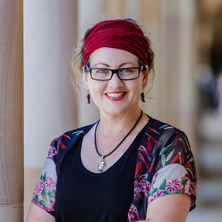The shift to online learning in response to the global COVID-19 pandemic has resulted in students feeling isolated and reporting that they do not feel as connected to the University, to their fellow students and their teachers as they may have in more traditional classroom settings.
We know that students who develop a sense of belonging within their learning environments are more likely to enjoy and succeed in their studies (Eloff, O’Neil & Kanengoni, 2021, Strayhorn, 2019). Yet developing this sense of belonging, building opportunities for connection, acceptance and support as university students in an online environment can be challenging
This webinar takes the form of a panel with experienced UQ teachers. Together, we will explore what belonging means, why it is important and how come it’s become a topic of interest. We will share examples of practice, strategies that have been used in online and face-to-face environments before workshopping potential strategies for some real-case scenarios.
Event details:
Registrations are now closed.
Expected outcomes:
Participants in this workshop will explore and develop understandings of what constitutes and enables a sense of belonging and connectedness for students. Outcomes will include both high-level pedagogical approaches and strategies and tactics for use in the online classroom.
Facilitators
 Dr Deanne Gannaway is an Associate Professor in Higher Education, based in UQ ITaLI. Deanne is a higher education curriculum thought leader and curriculum transformation expert with twenty years of experience in Australian universities. Her teaching and scholarship focus on continuing professional learning for university teachers and professional education for students. She is currently the Academic Lead of the Professional Learning and Reward and Recognition portfolios in ITaLI; course coordinator for PHSS2000 (an innovative WIL course for students in humanities, social science and arts at UQ) and the program coordinator for the HEA@UQ program.
Dr Deanne Gannaway is an Associate Professor in Higher Education, based in UQ ITaLI. Deanne is a higher education curriculum thought leader and curriculum transformation expert with twenty years of experience in Australian universities. Her teaching and scholarship focus on continuing professional learning for university teachers and professional education for students. She is currently the Academic Lead of the Professional Learning and Reward and Recognition portfolios in ITaLI; course coordinator for PHSS2000 (an innovative WIL course for students in humanities, social science and arts at UQ) and the program coordinator for the HEA@UQ program.
 Dr Allison Mandrusiak is an Associate Professor in Physiotherapy (Cardiorespiratory) at UQ, Australia. Allison has a special interest in simulation and coordinates the acute stream of The UQ Physiotherapy Standardised Patients Program which replicates a fulltime clinic using trained actors as patients. She oversaw construction of a simulated hospital ward at UQ, and this has springboarded further advancements in simulation and interprofessional experiences. Allison was involved in a large government funded national project to embed simulation into physiotherapy programs, in which she collaborated with 16 Australian universities through all stages of development, implementation and evaluation of simulation. She finds great joy in supporting others across professions to implement best-practice simulation, and other educational innovations.
Dr Allison Mandrusiak is an Associate Professor in Physiotherapy (Cardiorespiratory) at UQ, Australia. Allison has a special interest in simulation and coordinates the acute stream of The UQ Physiotherapy Standardised Patients Program which replicates a fulltime clinic using trained actors as patients. She oversaw construction of a simulated hospital ward at UQ, and this has springboarded further advancements in simulation and interprofessional experiences. Allison was involved in a large government funded national project to embed simulation into physiotherapy programs, in which she collaborated with 16 Australian universities through all stages of development, implementation and evaluation of simulation. She finds great joy in supporting others across professions to implement best-practice simulation, and other educational innovations.
 Dr Lynda Shevellar Is Principal Practitioner – Sense of Belonging in ITaLI. She is also Senior Lecturer, Director of Teaching & Learning and Equity & Diversity Support Officer in the School of Social Science, Faculty of Humanities and Social Sciences. Lynda’s teaching is focused on areas of social inequality, community development, ethical practice, and participatory research methods. She has a particular interest in the development of psychological safety in the classroom to help maximise belonging and participation. Lynda’s approach to teaching is underpinned by thirty years of experience in community development, the disability sector, mental health, and higher education. She won an Australian Award for University Teaching (AAUT) Citation for Outstanding Contributions to Student Learning in 2019 for supporting diverse, non-traditional and international students through community-centred learning approaches.
Dr Lynda Shevellar Is Principal Practitioner – Sense of Belonging in ITaLI. She is also Senior Lecturer, Director of Teaching & Learning and Equity & Diversity Support Officer in the School of Social Science, Faculty of Humanities and Social Sciences. Lynda’s teaching is focused on areas of social inequality, community development, ethical practice, and participatory research methods. She has a particular interest in the development of psychological safety in the classroom to help maximise belonging and participation. Lynda’s approach to teaching is underpinned by thirty years of experience in community development, the disability sector, mental health, and higher education. She won an Australian Award for University Teaching (AAUT) Citation for Outstanding Contributions to Student Learning in 2019 for supporting diverse, non-traditional and international students through community-centred learning approaches.
Contact us
For more information on any of the Enabling Partners Scheme (EPS) workshops, contact the Global Strategy and Partnerships team.
About UQ ITaLI
UQ ITaLI supports schools and faculties in providing productive and valued teaching and learning experiences, environments and outcomes that are aligned to the strategic priorities of the University.
